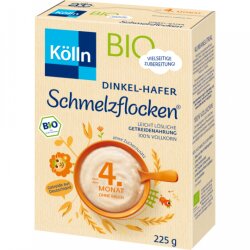Cornflakes: The perfect breakfast option for an energetic start...
Welcome to the Oatmeal category! Why Oatmeal? Oatmeal is not only...
Category: Cereal Welcome to our Cereal category As cereal...
Welcome to the Müsli & Fitness Bars Category In this category,...
Welcome to Our Seed Products As a passionate gardener, you know...
Cereals & muesli
The Importance of the First Meal of the Day
Unfortunately, many people nowadays do not take time for breakfast and settle for just a cup of coffee. However, the first meal of the day is particularly beneficial for both the body and the mind. It is thanks to breakfast that you get the necessary nutrients again after a 12-hour break (the time between dinner and breakfast). A balanced breakfast can significantly contribute to optimizing daily nutrition. Neglecting or skipping breakfast results in an incomplete (and therefore unhealthy) diet. A regular breakfast, among other things, improves nutrient absorption and can help maintain a healthy body weight. Breakfast is even more critical for young people than for adults: the first meal of the day is a prerequisite for being mentally and physically prepared to face challenges in kindergarten and school.
What are Cereals, Anyway?
The term "cereals" is derived from the Latin word "ceres," which means seed, grain, or cereal crop; the Roman goddess of agriculture is also named "Ceres." In German, cereals refer to almost all products made from grains and legumes that contain natural and added vitamins, minerals, and trace elements. Currently, every German eats about 2.4 kilograms of cereals per year. The common production methods for cereals go back to the invention of cornflakes at the end of the 19th century. US-Americans John Harvey Kellogg and Will Keith Kellogg cooked, pressed, and dried wheat to use the resulting cereal flakes as a vegetarian food. From 1906, cornflakes were produced industrially and increasingly successfully marketed. Similar methods were eventually used for maize and rice - and the range of cereals became correspondingly extensive. Today, you can choose not only from a considerable number of cereals in the form of flakes, rings, pillows, and others but also find various fitness bars.
Muesli and fitness bars are perfect as a small snack when no milk is available or if you don't like or tolerate milk. The history of muesli in bar form is relatively young: in the mid-1970s, US-American Herrick Kimball turned to a special invention magazine with the idea of selling muesli bars. However, Stanley Mason is also a possible inventor of the muesli bar. Regardless of who finally gets credit for the invention, cereal bars have become popular snacks in recent decades. You can now choose from bars that are hard or soft, filled or unfilled. Additionally, they can have chocolate, nuts, and/or dried fruit. Compared to chocolate bars, muesli and fitness bars are definitely the healthier alternative - especially if you choose products without added sugar.
From "Birchermues" to Today's Muesli
The first muesli was a type of puree that benefited patients at a sanatorium in the Canton of Zurich at the beginning of the 20th century and was already known to the Alpine herdsmen for about 100 years: the raw food meal consisted of oat flakes, sweetened condensed milk, apples, nuts, and lemon juice. Maximilian Oskar Bircher-Brenner called this muesli "Birchermues." Unlike today, it was not eaten in the morning but as a light meal in the evening. After World War II, German scientist Werner Kollath promoted whole food nutrition. For Kollath, representatives of the highest value level were untreated foods such as cereals, fruit, vegetables, eggs, and milk. In the 1950s, a full muesli consisted of a combination of ground grains (soaked for several hours before consumption), fresh fruit, and milk or yogurt. Whole grain flakes, which are now found in most muesli, are easier to handle and more durable than ground grains.
If you want to buy packaged muesli, you have the choice between numerous classic mueslis and special muesli varieties. A classic muesli consists of flakes of one or more types of grain, as well as dried fruit and nuts. If a product in the muesli category has an additional name (such as chocolate or nut), the amount of that ingredient is particularly high. A fruit muesli typically has a good weight proportion of various dried fruits. So-called crispy mueslis are also based on cereal flakes, but these are baked with the addition of various ingredients. Crispy mueslis are often complemented with nuts, chocolate, or fruit.
Oat Flakes - Versatile to Use
Oat flakes are primarily considered a staple food. They contain a high percentage of unsaturated fatty acids, soluble fiber, carbohydrates, and protein. B-vitamins and essential trace elements such as zinc and magnesium are also included. You can choose between instant flakes, small leaf flakes, and large leaf flakes: instant flakes consist of rolled oatmeal, while small leaf flakes (delicate flakes) consist of rolled oat groats and large leaf flakes (crunchy flakes) consist of rolled oat kernels. The different texture of oat flakes allows for various uses. Instant flakes are ideal for preparing infant formula, small leaf flakes, for example, for porridge, and large leaf flakes are the ideal ingredient for a crunchy muesli.
Cereals and Muesli in Stock
Since both cornflakes and oat flakes, muesli, and fitness bars are shelf-stable for several months, it is practical to stock up on products in the cereal and muesli category. The online food store offers you the opportunity to select and order the desired products in this category online. If several items are suitable for you, you can access the respective product description and compare the information with each other. Don't forget to study the existing product reviews, which can also help with the decision-making process. If you or one of your family members enjoy eating cereals and/or muesli but suffer from an allergy or intolerance, be sure to pay attention to the Allergies and Intolerances section. Here you will find information about gluten, soy, and sesame, for example.
